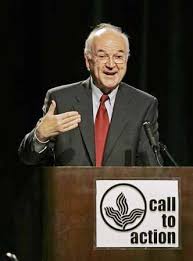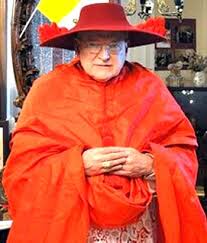Richard McBrien | Oct. 29, 2012

It's old news by now, but I want to add my name to the already long list of people who have supported the Leadership Conference of Women Religious against the Vatican and its allies in North America.
The nuns have been in the forefront of the struggle to keep the spirit and the letter of the Second Vatican Council alive, not only in religious communities of women but also in the Catholic church at large.
Unfortunately, LCWR is a scapegoat for everything the right wing in the Catholic church loathes. One should recognize that ultra-conservatives exist in the highest ranks of the Vatican, excluding no ecclesiastical office in the church.

As I said (to a standing ovation) at the symposium held in my honor at the University of Notre Dame toward the end of April, few North American Catholics would be Catholics today if it were not for the nuns. The nuns, I insisted (to another standing ovation), are the greatest asset to the church in North America, and one hopes and prays that the Vatican will soon come to realize that as well.
The nuns are not only among the leaders in the church who wish the keep alive the spirit and the letter of the Second Vatican Council, but are also among the thousands who are celebrating with the rest of the church the 50th anniversary of the council's opening in the fall of 1962.
It's old news by now, but I want to add my name to the already long list of people who have supported the Leadership Conference of Women Religious against the Vatican and its allies in North America.
The nuns have been in the forefront of the struggle to keep the spirit and the letter of the Second Vatican Council alive, not only in religious communities of women but also in the Catholic church at large.
Unfortunately, LCWR is a scapegoat for everything the right wing in the Catholic church loathes. One should recognize that ultra-conservatives exist in the highest ranks of the Vatican, excluding no ecclesiastical office in the church.
As I said (to a standing ovation) at the symposium held in my honor at the University of Notre Dame toward the end of April, few North American Catholics would be Catholics today if it were not for the nuns. The nuns, I insisted (to another standing ovation), are the greatest asset to the church in North America, and one hopes and prays that the Vatican will soon come to realize that as well.
The nuns are not only among the leaders in the church who wish the keep alive the spirit and the letter of the Second Vatican Council, but are also among the thousands who are celebrating with the rest of the church the 50th anniversary of the council's opening in the fall of 1962.
The council brought fresh air into the church, just as Pope John XXIII had hoped, but neither he nor his closest friends could have foreseen the terrible backlash he would also unleash.
He couldn't have foreseen, for example, the concerted efforts of his successors, Popes John Paul II and Benedict XVI, to undermine the council, consciously or not, by the appointment of bishops and archbishops unfriendly to the council.
Examples of such bishops are (with the diocese and year they were first ordained a bishop): Thomas Welsh, Arlington, Va., 1970 (now deceased); Thomas Daily, Brooklyn, N.Y., 1974 (now retired); Nicholas DiMarzio, Brooklyn, 1996; David Ricken, Green Bay, Wis., 2000; Richard Lennon, Cleveland, 2001.
Examples of such archbishops are: John Myers, Newark, N.J., 1987; Joseph Kurtz, Louisville, Ky.,1999; Jose Gomez, Los Angeles, 2001; Francis George, Chicago, 1990; Charles Chaput, Philadelphia, 1988; Edward Egan, New York, 1985 (now retired).
Nor could John XXIII have foreseen the wholesale assault on the nuns of the United States, not only in the "visitation" of the sisters' communities, but also in the investigation of LCWR, which has been the source of so much good for the U.S. church.
Neither could he have foreseen the demoralization that has set into the Catholic church nowadays, with many Catholics looking forlornly at the Second Vatican Council as if it never happened and the pontificate of John XXIII as if he never existed.
The bishops appointed by John Paul II and Benedict XVI insist they support the council, but that the council was misinterpreted by progressive Catholics. Progressive Catholics, on the other hand, feel the recent crop of bishops overemphasize the abortion issue to the practical exclusion of the church's traditional emphasis on social justice and the needs of the poor, which the Nuns on the Bus have highlighted.
We cannot overemphasize the fact that a pall of sadness now covers the church. Many have dropped out (the recent Pew poll disclosed that ex-Catholics constitute one-tenth of the U.S. religious landscape); others stay because they have found a worshiping community that meets their spiritual needs (usually on a college or university campus, where the long arms of a bishop cannot reach).
But I have not given up hope -- nor should you, my readers. The nuns (including LCWR) will eventually be vindicated, a new pope will be elected who the electors think is only a seat-warmer (just as they once regarded John XXIII), and the pendulum will swing the other way. It always has.
Some of us will never see the change, like the saintly Moses, but it will come. As John XXIII insisted, history is the great teacher of life. And history has much to teach us.
© 2012 Richard P. McBrien. All rights reserved. Fr. McBrien is the Crowley-O'Brien Professor of Theology at the University of Notre Dame.
But I have not given up hope -- nor should you, my readers. The nuns (including LCWR) will eventually be vindicated, a new pope will be elected who the electors think is only a seat-warmer (just as they once regarded John XXIII), and the pendulum will swing the other way. It always has.
Some of us will never see the change, like the saintly Moses, but it will come. As John XXIII insisted, history is the great teacher of life. And history has much to teach us.
© 2012 Richard P. McBrien. All rights reserved. Fr. McBrien is the Crowley-O'Brien Professor of Theology at the University of Notre Dame.

No comments:
Post a Comment